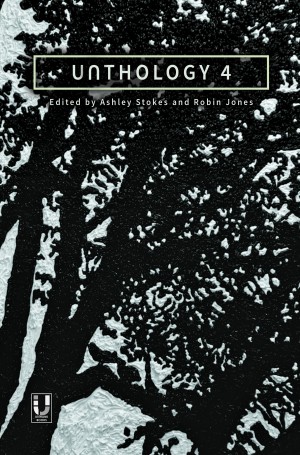You have no items in your cart. Want to get some nice things?
Go shopping All the world loves a lover. Untroubled responses to the world, born aloft by the knowledge the significant other will understand and encourage; well yes, what’s not to like? This, however, is not what you’ll find in Unthology 4. Unthank Books’ new short story collection, edited by Ashley Stokes and Robin Jones, is bereft of successful lovers. Instead we get a couple who can’t stand each other, even on holiday; a young thief who tries but fails to keep his better romantic self in check; a middle class woman whose biggest adventure starts when her marriage ends and other young-ish people like them. With a few notable exceptions, Unthology 4 mainly focuses on what it means to lose the other.
All the world loves a lover. Untroubled responses to the world, born aloft by the knowledge the significant other will understand and encourage; well yes, what’s not to like? This, however, is not what you’ll find in Unthology 4. Unthank Books’ new short story collection, edited by Ashley Stokes and Robin Jones, is bereft of successful lovers. Instead we get a couple who can’t stand each other, even on holiday; a young thief who tries but fails to keep his better romantic self in check; a middle class woman whose biggest adventure starts when her marriage ends and other young-ish people like them. With a few notable exceptions, Unthology 4 mainly focuses on what it means to lose the other.
In the opening story, ‘A Real T.O.A.’, by Rodge Glas, a young couple on holiday in New Zealand are barely on speaking terms. She is swimming in the sea while he lies on the beach, thinking through all the ways how not to fight her. When together, the pair count to ten before reacting to each other’s banalities and provocations. She has been on the phone to her mother for hours on end recently; he has been dreaming of meeting someone else, with eyes of a different colour. Then, suddenly, he thinks she has disappeared from the sea:
“You’re certain she’s gone, and if that’s what she wants then that that the way it should be. You were raised well, you won’t resist. And you don’t blame her for growing tired. God knows you’re tired too. Everyone is tired or bored or starting over.”
This immediately biased response to what may in fact be a tragic accident is very telling: personal misery easily trumps a more curious response. What we effectively get, in this downbeat opening story, is a spiritual resignation to what is bound to happen in reality.
In ‘Violet’, by Barnaby Walsh, Ryan pretends to like church literature to impress a library assistant. This teenage girl, Violet, is to his surprise immediately attracted to him. The pair are soon in her bedroom, kissing with a tenderness he finds difficult to master. Again, as in ‘A Real T.O.A’, we see things from the male perspective. Unlike the protagonist in the previous story, though, Ryan is not a ‘nice guy’:
“[He] sat alone at the foot of the bed. He looked at her; he looked at the walls, the window, the clock…The bed creaked as he got up. He stood over her. Reached out his hand and stopped it just from touching her face. Her eyes closed, and he thought that secretly she was awake, really, and wanting him to touch her. This’d be what she wants.”
But, well, it isn’t. She is in love with him and wants to teach him how to kiss; that only, to start with. But he struggles to take things slowly. He’s painfully aware of his emotional shortcomings, more comfortable to punch his fists into bloodied stumps on the church roofs he strips of lead than to say just what he feels. Things eventually move swiftly away from him, with a speed that both distresses and gives ‘Violet’ a well-achieved sense of inevitability.
The best story in the collection plays on the idea of certainty in life and love. ‘Finished’, by Sarah Bower, stands out for its worldly voice. The narrator is by turns witty, cynical, mature and entertaining: precise and yet more effortlessly expansive than the other stories’ narrators. The way in which the world changes after marriage is neatly summed up in a few memorable sentences:
“On Saturday nights, there are dinner parties, and now they are all married couples there are matching sets of crockery and cutlery, crystal glasses for everything from Perrier to port, starched snowdrifts of table linen. New classic dishes appear in the repertoire, involving goats cheese and balsamic vinegar and kiwi fruits. Wine is as often Chilean or Australian as French…The world is shrinking to the size of a dinner table laid for eight.”
Charlotte, a young girl turning into a middle-aged woman, marries Bob, who changes even more dramatically from gauche young man into an Establishment figure. The couple’s life together follows a careful script – one essentially finished before it is even enacted – before brute reality changes everything. Charlotte is less and less ‘finished’, eventually preparing her for a new, previously unimagined life.
A few of the stories do not centre on romantic love and its discontents. In ‘Burning Man’, by Rowena Macdonald, for example, a severely disfigured Gulf War veteran is accosted by an Eaton Square yuppie. Although slightly laboured and containing too many flashbacks to keep the story immediate , ‘Burning Man’ plays interestingly on the idea of spiritual versus physical disfigurement. ‘The Laundry Key Complex’, by Aiden O’Reilly, tells of a social misfit who not-so-secretly thinks he is better than everybody else, with the narrator at first repulsed and then intrigued by this posturing. ‘Administration: An Interns’ Guide’ looks ironically at the world of work:
“The internship started barely a week after my graduation. It was unpaid, of course; the class of naïf that would complete a literature degree is expected to refuse compensation even if offered. In the unlikely case that my employer resolved to pay and had somehow learned my bank details, I would withdraw the money, fold the notes into origami lilies and arrange these around the employer’s office.”
What unifies these and the other non-love stories with the rest is a resolute focus on the personal. Young people are by turns disappointed, surprised and ready to start all over again. Disillusionment and disagreement close off some issues, but raise new and interesting ones to live through.
All of the stories in Unthology 4 are worth reading; some of them are worth coming back to. ‘Finished’ is the most fun to read, while also being the wisest – look out for this one in particular. Occasionally, some of the stories are laboured, not quite coming to life as a result. But all is forgiven for a few well-placed sentences, of which there are enough to make this collection worth looking out for.
Unthology 4 was published in October 2013.

About Andre van Loon
Andre van Loon is a freelance literary critic, specialising in new British and American novels and studies of Russian nineteenth century literature. He holds an MA in English Literature & Russian Studies from the University of Edinburgh and lives in London.





Thank you, Andre! Lovely review.